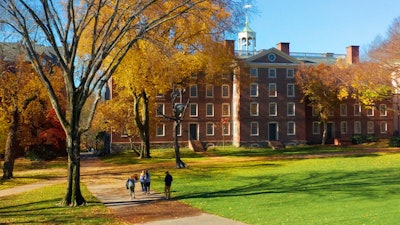 Brown University
Brown University
Opponents, including Brown, argue that these institutions give back to the community in other ways and should be exempt from such taxes. But many are saying it’s time for elite universities to stop acting like hedge funds with classes attached and start taking on a greater share of public responsibility.
“Unfortunately, well over 40% of our land in the city of Providence is exempt from taxes in large part because of colleges and universities,” said David Morales, Rhode Island Representative of District 7 in Providence. “That places the burden on working class families. These universities continue to grow rapidly in the city, removing land that is eligible for taxation. This has created a cycle where property taxes are rising to make up for lost revenue. We have to ensure more equity in our tax system.”
Morales sponsored both bills in Rhode Island. The first, H7925, would allow taxes on private nonprofit colleges’ properties, raising revenue for the municipalities’ general funds. Morales said he is considering an amendment to specify this tax would be levied on property not tied to the university’s mission.
The second bill, H7813, would permit municipalities home to a higher education institution to enforce a tax of up to 2% on each institution’s endowment. From this tax, all revenue would only be used to support that municipality’s public school district.
In Providence alone, if each institution were taxed the maximum 2% of their endowment, then the city’s public schools could receive up to $160 million. Brown University stands as the richest institution in Providence by far. A 2% tax on the university’s current $6.9 billion endowment would generate about $138 million for the city.
“I think the proposals to tax endowments in Rhode Island and elsewhere reflect that our very wealthy, elite institutions are not doing enough to provide educational mobility for large swaths of America,” said Dr. Charlie Eaton, an assistant professor of sociology at the University of California, Merced and author of Bankers in the Ivory Tower: The Troubling Rise of Financiers in U.S. Higher Education. “And that starts with them not enrolling enough students relative to their resources.”
At the end of fiscal year 2021, as many colleges across the country struggled to stay afloat in the pandemic, Brown’s endowment ballooned with a 51.5% rate of return to reach that $6.9 billion figure. The endowment amounts to roughly $796,000 per student. Other selective, rich institutions saw similarly staggering gains in the last two years, which only further the divide between the haves and have-nots of higher education.
Eaton noted that most undergraduate students at Brown do not have any student debt because they tend to come from wealthy families. On top of that, about 6.6% of Brown undergraduates from the U.S. hailed from Rhode Island in the 2021-22 academic year.
“It’s not just that the students they enroll are disproportionately white and wealthy,” said Eaton, who referred to the country’s most selective universities, not only Brown. “It’s also that they just don’t enroll enough students. Brown’s endowment has increased several fold over the past few decades. But the number of students that Brown enrolls has not increased several fold.”
Eaton added that if Brown today were to go back and spend the same amount of money that it spent from its endowment in the 1980s on a per-student basis, then it would have to enroll two or three times as many students as it enrolls currently.
Despite massive returns, wealthy institutions like Brown rarely significantly increase their average annual spending rate of their endowments. Brown’s spending policy currently states its payout amount is between 4.5% and 5.5% “of the average market value of the endowment over the prior 36 months,” according to the university’s website.
“It’s operating a lot like a hedge fund with a university attached,” said Eaton. “To really serve educational opportunities for the people of Rhode Island and the people of the region, Brown needs to enroll more students—and needs to enroll more students from less advantaged backgrounds."
Endowments are a group of tax-exempt donations and investments that universities maintain. A university’s endowed funds pay for salaries, research, financial aid, and other expenses. Some parts of endowments are restricted to uses that donors specify when they make their gifts. But such restrictions do not preclude states from taxing the funds if bills like those in Rhode Island pass.
“Brown continues to believe that taxes imposed through legislative efforts impede the efforts of higher education institutions to help students, improve education, expand the boundaries of knowledge, advance technological innovation, and enhance health and well-being in our local communities,” wrote Brian Clark, a spokesperson for Brown, in an email to Diverse. “Legislative efforts such as these tend to overlook that Brown provides extensive contributions to the community we call home in significant areas that meet public need and offset the need for greater public resources.”
Clark noted Brown pays taxes on all commercial properties and makes voluntary payments to Providence annually. The university does pay $4.4 million through two Memorandums of Understanding that are both on track to expire in 2023.
In addition, Brown employs 4,700 local residents as a top employer in Providence. The institution has invested more than $225 million in the city’s Jewelry District over the past decade, according to Clark. Each year, Clark said that Brown also “inject[s] more than $200 million in research spending to the local economy.”
Still, some critics push back, saying these numbers don’t exactly add up.
“These Rhode Island bills are historic as part of a wave of reconsidering tax discriminations, especially since the pandemic showed rising disparities in Black and brown neighborhoods with these affluent institutions in the middle of those communities,” said Dr. Davarian Baldwin, the Paul E. Raether Distinguished Professor of American Studies at Trinity College and author of In the Shadow of the Ivory Tower: How Universities are Plundering Our Cities. “Higher education has had its properties under tax exempt status for decades. But what has brought this to such a heightened pitch of concern and outrage is what I call the rise of the knowledge economy.”
Baldwin has been working with supporters of the Rhode Island bills since the proposals were introduced. To him, the “knowledge economy” refers to how higher education research and development is increasingly being used to create profitable goods and patents, from software to pharmaceuticals. Campus properties have become tax shelters in the process, he argued.
“There is a growing disparity between so much property hoarded on these campuses and the divestment and impoverishment of surrounding communities,” said Baldwin, who pointed to Philadelphia’s tense relationship with the University of Pennsylvania and the city of New Haven’s relationship with Yale University, as other examples of this disconnect. “And these universities have become the biggest landowners and employers in their communities. Local people are often working low-wage campus jobs, discouraged from labor organizing. There are a lot of layers to this.”
In 2017, the Trump administration created a federal reform law that imposed a 1.4% excise tax on the net investment income of private higher education institutions enrolling at least 500 tuition-paying students and with at least $500,000 per student in assets. As such, the law focused on wealthier institutions, which strongly opposed the move.
“Taxing the endowments of private colleges is ill-conceived at the federal level and has created a dangerous precedent at the state level,” wrote Karin Johns over email to Diverse. Johns is the director of tax policy at the National Association of Independent Colleges and Universities (NAICU), an advocacy group for private, nonprofit higher education.
NAICU has spoken out against the federal law as well as Rhode Island bills.
“When cities and towns fail to do their financial jobs, they simply can’t take the money from private colleges,” wrote Johns. “Mayors need to reshuffle their budget priorities and make better funding decisions—and not look to charitable donations to private colleges to shoulder that burden.”
To Morales, these arguments don’t explain Providence's struggling public schools less than two miles from manicured campuses of wealthy institutions.
“This has been an issue in our community for decades,” added Morales, who noted that he went to Brown for his graduate degree. “A lot of residents and politicians complain about this problem, but I think what makes this historic in our state is we are trying to do something about it. Everyone claims that universities should be doing more for our communities, but this is the first time we are quantifying what that could actually mean.”
Morales pointed out that three out of four candidates running for mayor of Providence support the two Rhode Island bills.
To Eaton, the bills are “great experiments” that could, if passed, go a long way to help the people of Rhode Island. But he said that a federal shift is key.
“To really change the disconnect between elite schools and most of the country, I think we will need a change in federal higher education finance law and tax law,” said Eaton. “One change you could imagine is having higher taxes on endowments that do not enroll a certain number of students from diverse backgrounds per endowment dollar.”
Baldwin added that messaging over diversity, equity, and inclusion, or DEI, has swept campuses across the country, including at rich institutions. But when it comes to taxes dipping into the coffers of endowments, how far do these DEI moves really go?
“Because of the racial reckoning with George Floyd, universities are pushing this DEI branding, including at extremely affluent, predominantly white institutions that are in Black and brown neighborhoods,” he said. “But if these institutions’ DEI work does not extend to those communities, then those are hollow efforts.”
Rebecca Kelliher can be reached at [email protected].



















